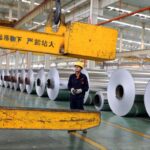Argentine President Javier Milei outlined fresh details of his currency strategy Tuesday, a key and necessary first step before his government expects to return to capital markets in 2026.
Milei said his government would adopt a “flexible” exchange rate on the peso after it lifts capital controls at an undetermined time. It’s the first inkling that the libertarian intends to implement a more orthodox currency policy after dismantling the controls he inherited after taking office last December.
“If there’s no excess supply of pesos, I can liberate controls, even when I don’t have dollars, because I am going toward a flexible exchange rate,” Milei said during his keynote speech at the close of Argentina’s Central Bank’s annual conference.
Argentina’s president previously said he and his economic team hadn’t decided whether to fix the exchange rate between the peso and the US dollar or move toward a free-floating currency. Milei still did not set a timeline for the removal of capital controls, referred to locally as the cepo. A lack of foreign reserves, which remain in the net negative territory, has long been an impediment to lifting controls over fear of capital flight.
How Milei handles the peso after lifting controls will be critical to managing triple-digit inflation, welcoming foreign investment and forging ahead with a $44 billion debt owed to the International Monetary Fund. Economy Minister Luis Caputo previously said Argentina would return to markets in early 2026, providing something of a time frame to begin lifting capital controls.
Argentina had a free-floating exchange rate from late 2015 to 2019 before a run on the peso amid election volatility forced the government at the time to slap controls back in place. Since then, Milei’s predecessor, Alberto Fernandez, only piled on more controls and restrictions.
Besides getting rid of the country’s monetary overhang, the president said Argentina’s inflation had to converge with what he calls induced inflation. He has previously listed international inflation, the crawling peg currency devaluation of 2% and capital controls as driving factors of the phenomenon.




